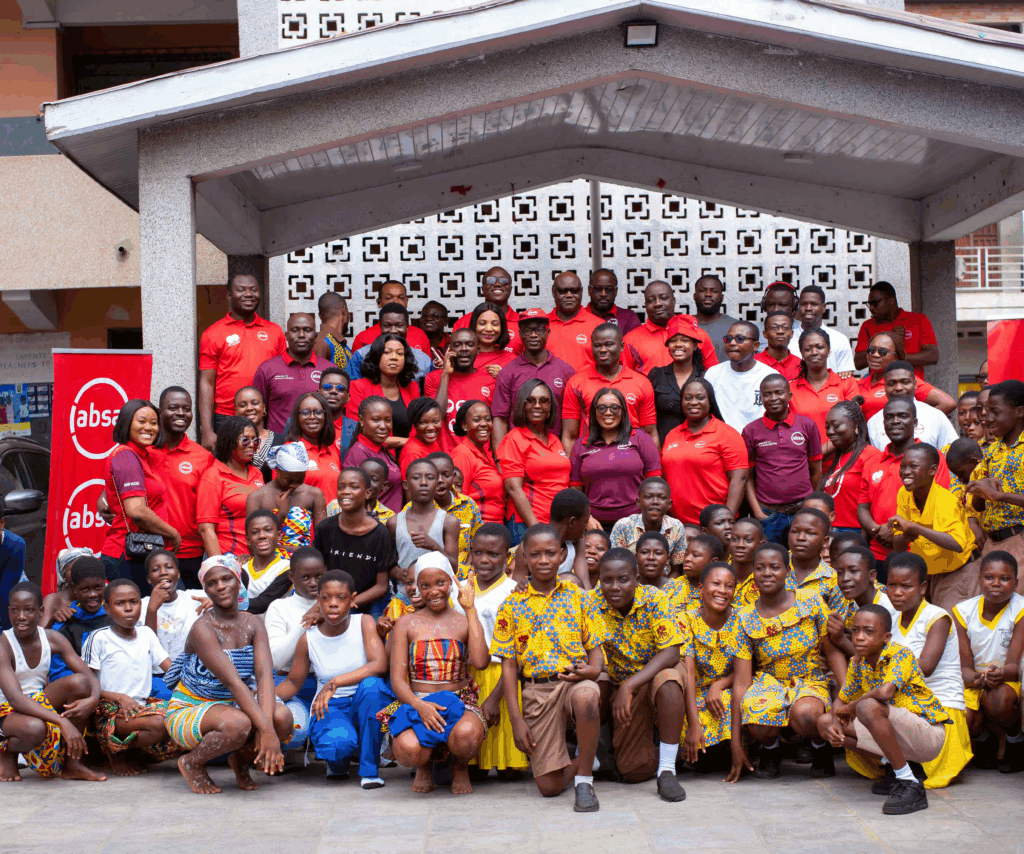By Absa Bank Ghana 15pm,Abubakar Ibrahim
Copyright myjoyonline

In the heart of Accra, a purposeful initiative unfolded as colleagues from Absa Bank Ghana gathered at Derby Avenue Basic School to demonstrate what it means to be a Force for Good.
They showed our communities why they can bank on us to deliver more than just funds, but also opportunities.
As part of this team-led initiative, the school’s computer lab was refurbished and equipped with 30 new computers, providing students with essential digital tools for learning and growth.
This commitment was realised when 81 passionate employees from Absa’s Corporate and Investment Banking (CIB) department came together to support the students of Derby Avenue Basic School.
Recognising the urgent need to enhance digital literacy in education, the team, through self-generated funds, took proactive steps to fully equip the computer lab, empowering students with the resources they need to thrive in today’s world.
Why would corporate professionals step away from high-stakes financial decisions to invest time and resources in a local school?
For Absa Bank Ghana, the answer is found in a deliberate push to embed colleague volunteerism within its organisational culture.
Between January and August 2025, more than 690 Absa employees volunteered their time and expertise in 22 outreach activities across Ghana.
The scope of Absa’s volunteer initiatives is broad and impactful, ranging from financial literacy and mentoring sessions for young people to digital skills workshops at schools such as Derby Avenue Basic School, where laptops were presented to enhance learning.
At Okuapeman Senior High School, the Finance team volunteered their time and supported the school with 11 braille laptops to improve access to technology for visually impaired students.
In addition to educational outreach, several teams within the business have extended their support to various community-focused causes.
The Operations Department (COO) supports the Street Academy, a non-profit project focused on underprivileged children.
The Absa Men’s Zone supports the Accra Psychiatric Hospital, contributing time and resources to improve patient welfare, while the Women’s Network Forum (WNF) supports The Ark Foundation, which provides shelter and advocacy for women and children affected by abuse.
Further, financial literacy sessions were held at Labone SHS, Accra Girls SHS, West Africa SHS, St. Mary’s SHS, and several other schools across the country.
In total, Absa colleagues volunteered over 2,400 hours, reaching more than 11,000 students, teachers, and community members.
One of the most notable examples this year is a visit to Apirede, a small town in Ghana’s Eastern Region, where Absa Bank Ghana volunteers sat with students in a basic school classroom, taking turns to lead practical sessions on financial literacy, teaching school children the basics of saving, budgeting, and making smart choices with money.
For the pupils, it was an introduction to money management. For the Absa team, it was an opportunity to step outside their corporate roles and contribute directly to the community.
Priscilla Yeboah, Head of Citizenship at Absa Bank Ghana, who led one of the financial literacy sessions, describes the experience as deeply rewarding.
“It is a reminder that learning goes both ways,” she notes. “You see the enthusiasm in the children, you are reminded why practical skills matter, and as volunteers, we also leave with a new sense of purpose.”
While the scenes differ, the purpose remains consistent: to be a Force for Good and create meaningful engagement between the bank’s employees and the communities they serve.
According to research conducted in 2023 by Trialogue and forgood, South Africa’s largest volunteering platform, employee volunteerism delivers measurable benefits not only for communities, but also for the volunteers themselves.
In the survey, 83% of corporate volunteers in South Africa reported that their participation increased their pride in their organisation, while 67% said the experience helped them develop new skills relevant to their work.
Globally, studies show that employees who volunteer through their company are 43% more satisfied with their jobs and twice as likely to recommend their employer compared to those who do not participate.
Also, three out of four employees surveyed in African and international studies indicated that volunteer activities contributed to a stronger sense of purpose and well-being in their work life.
For many, volunteering is also seen as an essential part of workplace morale and a catalyst for developing leadership and teamwork skills.
Although most large-scale studies on these outcomes are concentrated in South Africa and other major markets, many Ghanaian corporates – including Absa Bank Ghana – are observing similar trends among their own employees.
For many Absa employees, the impact of volunteering is immediate and personal. Many employees reported improvements in communication, public speaking, and teamwork skills; abilities that are valuable both inside and outside the workplace.
Others point to the sense of fulfilment and renewed motivation that comes from seeing their efforts make a tangible difference.
As Absa Bank Ghana expands its colleague volunteerism efforts, the cumulative impact is becoming clearer, both for the communities reached and for the employees themselves.
Experiences gained through volunteering are helping to build a workforce that is more engaged, adaptable, and connected to the bank’s broader purpose of ‘Empowering Africa’s Tomorrow Together… One Story at a Time’.



